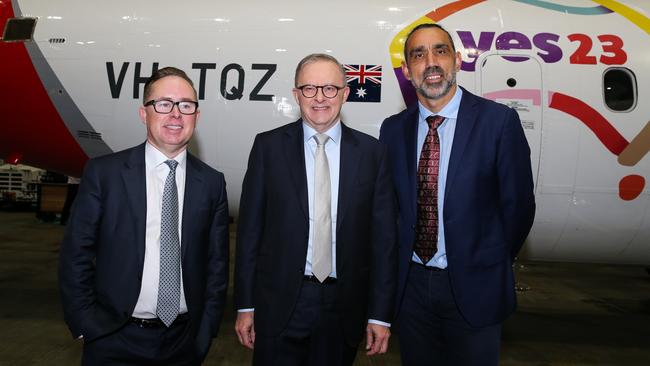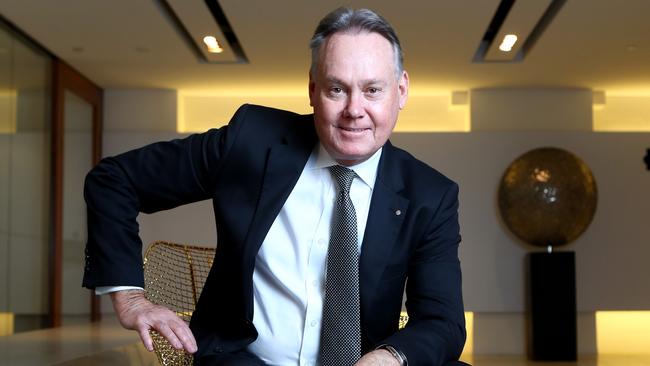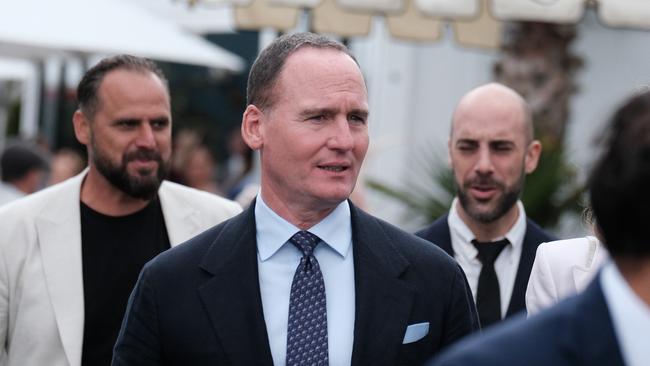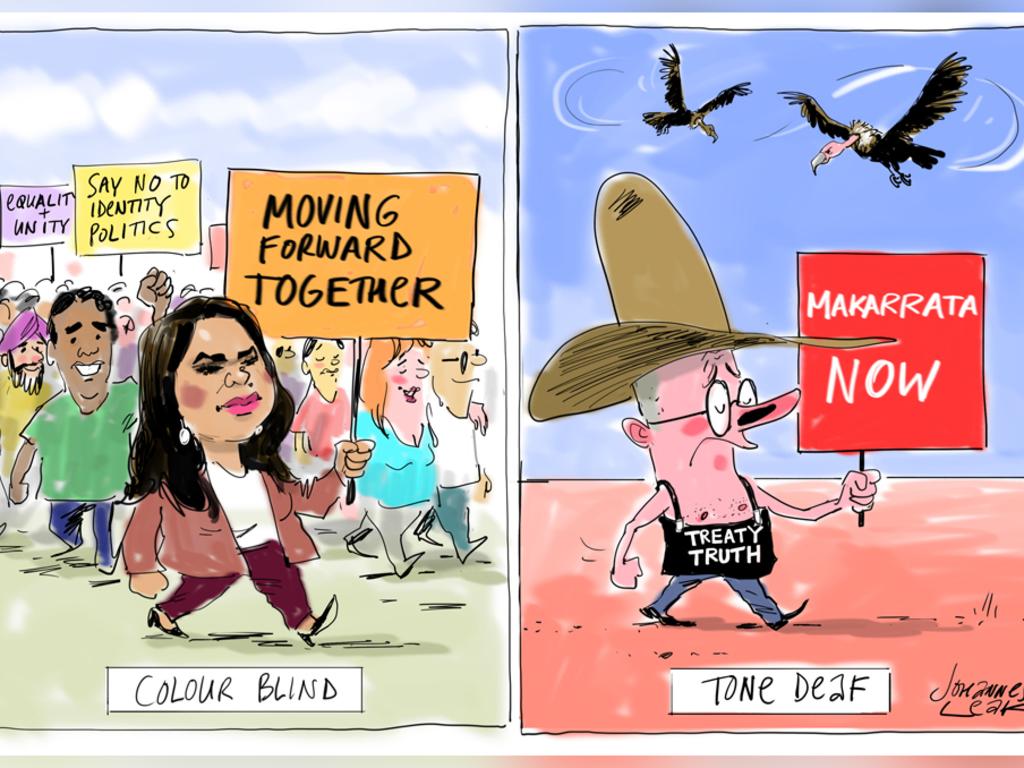The voice: bad case of poor corporate governance
With the referendum for the Indigenous voice to parliament behind us, the nation’s companies who backed the cause need to consider their governance failures.
Companies that became too “woke” and poured time and money into the Yes vote for an Indigenous voice to parliament have ignored their staff and customer bases and executed extremely poor governance standards.
That’s the message from a number of board members and executives after more than 60 per cent of the nation voted against the Albanese government’s polarising referendum and outspoken advocates such as Qantas, Wesfarmers, BHP and Australian Football League consider what comes next.
“It was particularly poor governance to have endorsed the proposition before it had even been formulated and passed by the parliament,” said Graham Bradley, chairman of Infrastructure NSW, United Malt Group, and Virgin Australia International.
Imagine if boards had supported a strategic business idea that hadn’t yet been formulated, he added.
“I think a lot of organisations will think twice – should anything like this arise in the future – about the merits of taking a public position, let alone putting their organisation’s hands behind it.”
The road to hell is paved with good intentions, so it is said.

Across the western world, companies are trying and often misstepping in their efforts to prove they have a social licence to operate. It’s all part of the increased focus on environmental, social and governance issues that many major pension funds are pushing.
US beer brand Bud Light saw sales plummet after hiring a transgender influencer, with many of its American football-loving customers saying it didn’t reflect their values, and the LGBTQ community angry that the brand didn’t react more strongly to support them during the backlash.
British pub chain Wetherspoons had £18m wiped from its share price after the vote to leave the European Union, with founder Tim Martin – an outspoken Brexiteer – admitting at the time it could lead to the cost of a pint rising to £10.
BHP chairman Ken MacKenzie was forced to defend the decision to donate $2m to the Yes campaign – a tax-deductible figure, it must be noted – at a shareholders forum on Thursday.
Mr MacKenzie there was a “strong linkage” to the BHP’s business operations and interests. The mining giant operates on traditional lands, and is a large employer of First Nations peoples and had discussed views on the voice with their representatives before taking a stance, he said.
“This engagement confirmed that our indigenous partners expected BHP to advocate for a voice,” said Mr MacKenzie. “We have been supportive of indigenous constitutional recognition since 2015 … our relationship with traditional owners and other indigenous partners are some of the most important relationships we have as a business.”
The same level of engagement with stakeholders was not widespread among other companies.
In the case of the voice to parliament, Mr Bradley believes few of the sporting organisations and companies that spoke out bothered to canvas their members, shareholders, or employees.
“Had they done so, they would have found the same division. The general community was divided on this issue, which made it problematic for them to have taken a position which rightly or wrongly is interpreted as representing the company and its stakeholders,” he said.
It’s a view firmly backed by Brickworks managing director Lindsay Partridge, whose firm did not give money to either side of the debate or push a specific way to vote.
“BKW stayed well clear of taking a public position as we considered it was a personal decision for shareholders, customers and staff,” Mr Partridge said.
“There was no way supporting any position would be good for the company, and this also aligned with our policy of no political donations,” Mr Partridge added.

To be sure, in the early days the Indigenous voice to parliament had popular support, but only eight of Australia’s 45 referendums have resulted in change and all had bipartisan support. This one, like Brexit before it, became highly politicised.
The Albanese-government could have pushed through a legislative change instead, but may have counted on winning after the widespread public support in 2008 for the formal apology given by then-prime minister Kevin Rudd to Aboriginal and Torres Strait Islander peoples for past government policies such as forced child removal.
On this point, Tony Shepherd, who chairs the Sydney Cricket Ground Trust and Macquarie Specialised Asset Management, said young Aboriginal people are still hurting, and it’s time for the government to make real changes.
“Simply stop talking and do something,” said Mr Shepherd. “Children are suffering. We should be working now with the affected communities to solve these serious issues.”
So how, then, do companies know when they should be getting involved?

It’s a contentious issue. One founder said the average person already fears big companies are running the world, and they do not want that same group of seemingly wealthy elites to be telling them what they should think and how to vote.
“I think it’s a turn-off,” said the executive who did not want to be named. “Most people already think big corporations have too much power, and trying to get involved in things like this just screams of populism.”
Mr Bradley said he advises all companies to only become involved when they have a “legitimate authority to contribute to public policy debate”
For him this is usually around corporate regulation, employee relations, taxation policies, international trade policies, and things that more directly affect their business and therefore their employees, their customers and their shareholders.
“When you get to social policy issues, particularly ones that are divisive political issues, I don’t think there shouldn’t be the same expectation on the part of stakeholders that the company takes a view because they have no legitimate platform for doing so,” he said. “It’s problematic for companies to take positions on political social policies because it’s not clear who they’re speaking for.”
Perhaps a bit of rebranding on ESG would help too.
The world’s biggest fund manager, BlackRock, has been the target of an investment boycott in Texas over its stance on issues such as decarbonisation and lost an estimated $US$4bn out of its $US9 trillion under management in a highly politicised campaign.
BlackRock chief executive Larry Fink recently said his firm would continue to push for the ESG issues it believed it, but would no longer use what he said has become a highly “weaponised” word.
Sadly, the voice had no real chance of passing once it tried to hitch a ride on the ESG corporate bandwagon, rather a bipartisan effort to effect much needed change.






To join the conversation, please log in. Don't have an account? Register
Join the conversation, you are commenting as Logout